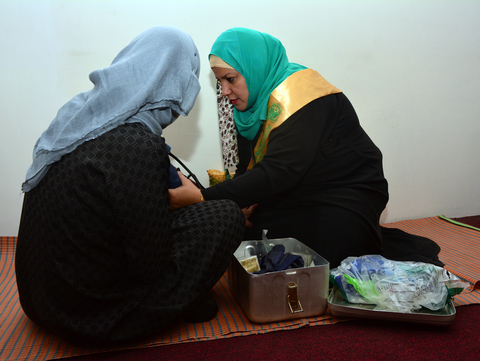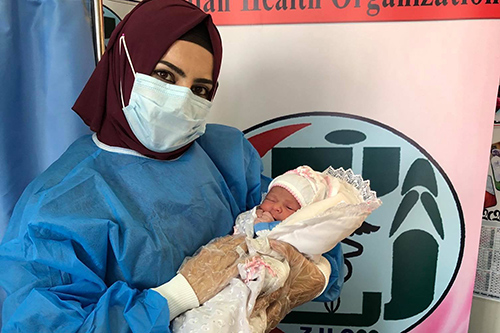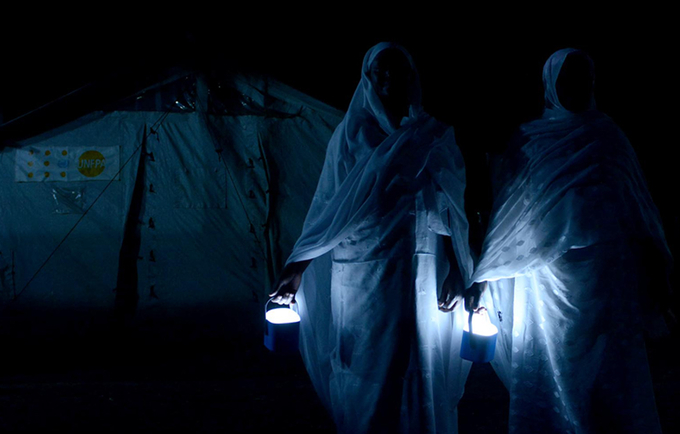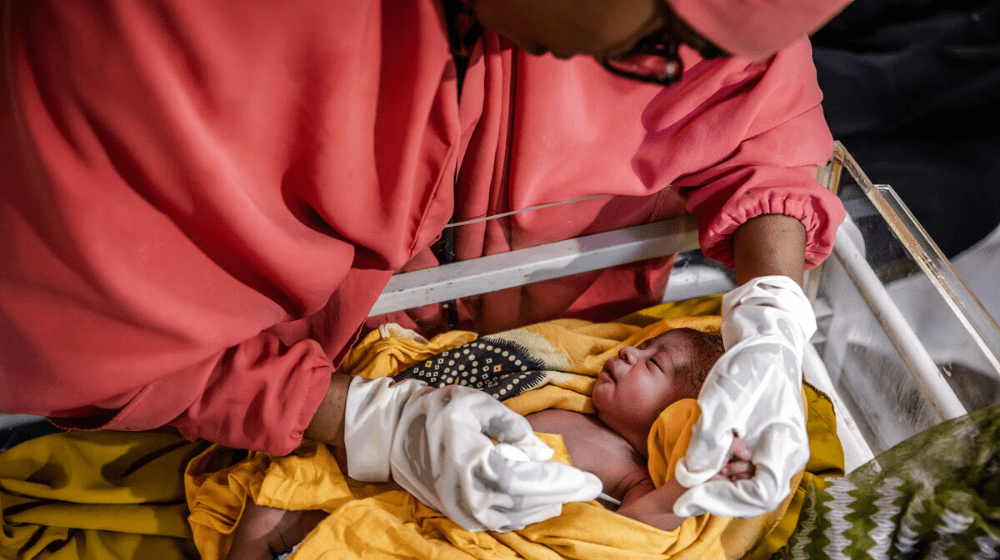Childbirth is perhaps the riskiest and most miraculous time in a woman's life. Every woman remembers the mixed feelings of excitement, anticipation ,fear and joy she experienced on her way to give birth.. It is hard to imagine the fear and anxiety that a pregnant woman - a sister, a friend, a wife - goes through as she approaches one of the most significant moments of her life. Now imagine her giving birth without anyone in the room ! Without any professional help - it is terrifying !!
“I was in labour for almost four days, and at the end, the child came out of my womb dead. I didn’t receive any assistance from a skilled birth attendant – only my family helped me with very basic tools.” said Abida, a 17 years old woman from Yemen.
Recently, we have seen significant advancements in the age-old profession of bringing life into the world. This advancement has contributed in reducing maternal and newborn mortality and stillbirths, and in improving the health and well-being of women, newborns and adolescents in the Arab region, yet, there is a staggering shortage of 128,000 midwives. Gender inequality is an unacknowledged driver in this massive shortage, but it is not the only challenge. The need for better policies and greater investments to allow midwives to be educated according to international standards, to perform their full scope of practice, strengthen primary healthcare systems and provide a pathway to universal health coverage, is another driver.
Midwives are among the best-skilled birth attendants who can save the lives of mothers and children during childbirth.
“Midwives now work day and night to save the lives of mothers and newborns. I oversee five deliveries per week, mostly for poor, marginalized and displaced women” said Molatf, a Yemeni midwife who has been providing midwifery services for 22 years now.

Below are four reasons why midwives deserve greater investment in their capabilities and workplaces and to fully acknowledge their skills and contributions.
Midwives save millions of lives each year
Every pregnant woman deserves a safe delivery – even if she is living through a humanitarian crisis. Yet unfortunately, this is not the reality. Every two minutes, a woman dies during pregnancy or childbirth, shattering families and leaving behind loved ones. The joy of bringing a child to the world safely is a moment every mother deserves to enjoy. Giving birth safely, comfortably and conveniently at home or in clinics should not be a luxury, but a basic human right. Midwives can provide this care, saving lives in the process. If deployed in larger numbers, well-trained midwives could help avert roughly two thirds of all maternal and newborn deaths, according to the most recent State of the World's Midwifery report.
“A 35-year old pregnant woman came to our clinic with abdominal pain,” recalled Hawrin Yousif, a midwife in the Khazir displacement camp in the Kurdistan Region of northern Iraq. “After conducting a medical check-up, I understood that she had been going through early labour for the last five hours and urgently needed to be taken to the maternity hospital in Erbil.” An ambulance raced them to the hospital, but the woman’s labour was progressing too quickly. “The mother was so scared and she kept begging me to bring her baby to life safely: ‘Don’t let him die’,” Yousif said. “My heart was beating fast. I knew that their lives were at risk.”
With quick action, Hawrin was able to deliver the baby safely. But many women and newborns are not so lucky to have a well trained midwife like Hawrin.

Midwives are key to Universal Health Coverage
Midwives play a critical role not only in delivering healthcare to millions of women and girls, but
also in providing antenatal, pre-pregnancy, postpartum, neonatal care counseling, psychological support to help mothers and their families raise healthy children. Especially in humanitarian settings due to their unique knowledge and skills, position as frontline providers and geographic and social proximity to the communities they serve.
They may walk miles to reach women regardless of their geographical locations - which is often a key determinant of whether a woman and her newborn will survive - or open space in their own homes to receive pregnant women and help them safely give birth. Yet they still face numerous challenges that pose a barrier to their work and mobility such as the lack of electricity in rural areas, displacement settings and refugee.
“When there is no electricity, we carry women in labor during the night out of their tents, lighting a fire in an open space so we can operate.” Hawa, a midwife from West Darfur, Sudan.

Midwives in West Darfou during night shift
In addition to their critical clinical duties, midwives have a broader role such as advancing primary health care and Universal Health Coverage (UHC), and addressing sexual and reproductive health and reproductive rights. They can be powerful agents of change, e.g. in promoting and enhancing women’s empowerment and behaviour change on family planning, and also in addressing harmful social and gender norms and practices, including female genital mutilation.
Midwives are champions of sexual and reproductive health
Midwives are an incredibly crucial part of a detailed and long programme of care. Their role goes beyond delivering babies and their responsibilities extend far beyond the maternity ward. They also help in promoting health in communities, and supporting patients and their families. Not only this, but they can also serve as powerful advocates of respectful care and women’s rights.
“I accompany women on their journey towards motherhood, and this is a huge responsibility,” said Fardoussalgueh Mahamoud, a midwife who works at Cheiko hospital in Balbala, Djibouti. “I do my best to ensure that they have the right information, including risks and benefits of choice, to make the decisions that are right for them and their babies.” she added.
Yet midwives face persistent gender discrimination that prevents them from achieving professional autonomy and leadership roles. They also endure gendered disparities in pay and career growth, affecting retention.
“Because of the dire circumstances in Yemen, nobody pays me anymore. I work mostly for free now or provide consultations over the phone. I offer midwifery service at homes because I have no clinic and my house was damaged.” said Balqis al-Twiti, a midwife from the Yemeni capital city.
Midwives provide a cost-effective solution
Midwife-led care as a model of practice has been shown to be both cost-effective and cost saving, The UNFPA State of the World's Midwifery Report 2021 has demonstrated unequivocally that investments in midwives is the most cost-effective way to achieve targets on maternal mortality, neonatal mortality, and women’s health and rights. Evidences show that if midwives are available in sufficient numbers, supported, regulated according to recognized standards and working across their whole scope of practice as part of an integrated team within an enabling environment, they could meet about 90% of the global need for essential sexual, reproductive, maternal, newborn and adolescent health (SRMNAH) interventions. Despite this massive potential, midwives comprise a small minority of the regional SRMNAH workforce, and they are receiving low salaries that are not comparable with similar professions and are sometimes not enough to live on.
“Because of the dire circumstances in Yemen, nobody pays me anymore. I work mostly for free now or provide consultations over the phone. I offer midwifery service at homes because I have no clinic and my house was damaged.” said Balqis al-Twiti, a midwife from the Yemeni capital city.
There is no better incentive to make midwives more central to all health systems and to ensure that they are educated, protected and treated as the valued professionals they are.
What is UNFPA doing ?
Making motherhood safer is a human rights imperative and lies at the core of UNFPA mandate. UNFPA is striving to make midwifery an autonomous, well-respected, fully supported profession that is fully integrated within health systems. Midwives are our unsung heroes shepherding new life into the world, while protecting the health, well-being and lives of mothers and babies in every place.
UNFPA, together with over 40 global partners and over 300 national partners, works to scale up quality midwifery education, policies and services around the world. UNFPA and its partners also work to strengthen midwifery training curricula, institutions, associations and regulations. UNFPA’s support for midwifery now spans over 120 countries, including the 39 countries with the highest rates of maternal mortality, which receive targeted support through the Maternal Health Thematic Fund.


